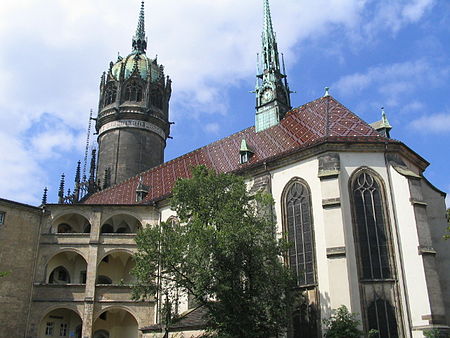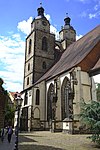All Saints' Church, Wittenberg

All Saints' Church, commonly referred to as Schlosskirche (Castle Church) to distinguish it from the Stadtkirche (Town Church) of St. Mary's – and sometimes known as the Reformation Memorial Church – is a Lutheran church in Wittenberg, Saxony-Anhalt, Germany. It is the site where, according to Philip Melanchthon, the Ninety-five Theses were posted by Martin Luther in 1517, the act that has been called the start of the Protestant Reformation. From 1883 onwards, the church was restored as a memorial site and re-inaugurated on 31 October 1892, 375 years after Luther's posting. Because of its religious significance and testimony to the lasting global effects of the Reformation, the church was inscribed on the UNESCO World Heritage List in 1996 along with other sites in Wittenberg and Eisleben associated with Martin Luther and Philip Melanchthon.
Excerpt from the Wikipedia article All Saints' Church, Wittenberg (License: CC BY-SA 3.0, Authors, Images).All Saints' Church, Wittenberg
Schlossplatz,
Geographical coordinates (GPS) Address Website External links Nearby Places Show on map
Geographical coordinates (GPS)
| Latitude | Longitude |
|---|---|
| N 51.866388888889 ° | E 12.637777777778 ° |
Address
Schlosskirche
Schlossplatz 1
06886 , Altstadt (Wittenberg)
Saxony-Anhalt, Germany
Open on Google Maps





